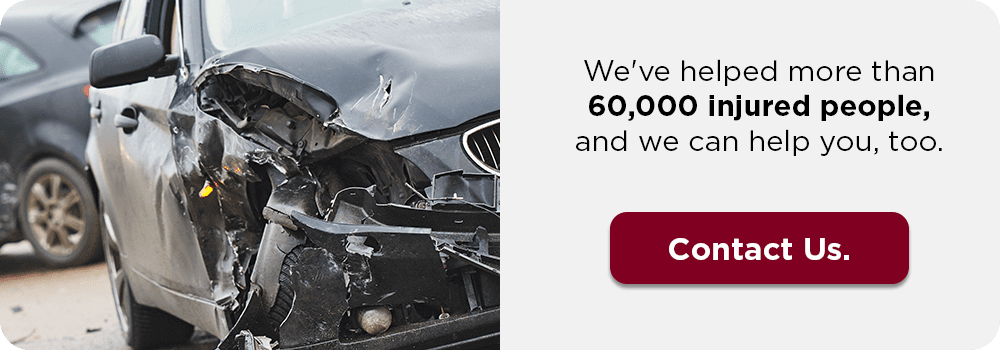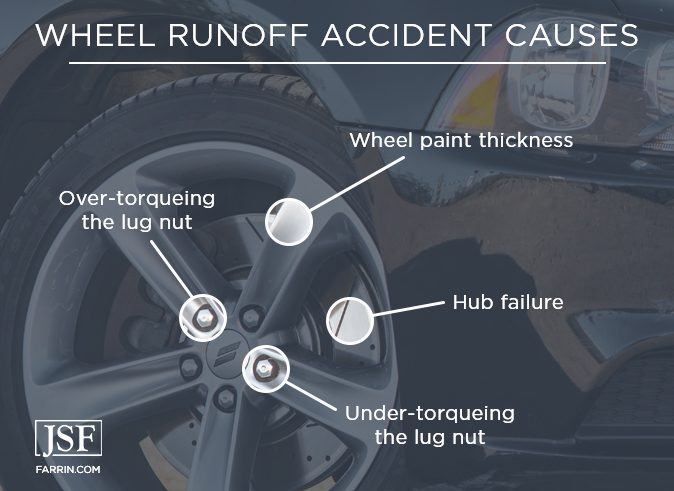No one is prepared for a wheel to come off their car while they are careening down the I-85 near Greensboro or the I-77 near Charlotte. Nor are they usually prepared to encounter a runaway tire as they are headed down the I-40 to the Crystal Coast. Yet it happens more often than you might realize.
Crashes involving a detached wheel are known as wheel runoff or detached wheel accidents.
A Wheel Runoff Crash Is a Road Debris Crash
A wheel runoff accident is often referred to as a road debris crash. Approximately two-thirds of road debris-related crashes involved debris that became detached from a vehicle, including wheels, tires, driveshafts, etc. These items can either strike another vehicle as they detach or remain on the roadway and contribute to a crash.
Our firm has represented thousands of car wreck cases, some of them wheel runoff accidents. Here is how these types of accidents happen – and who can potentially be at fault when they do happen. (Spoiler alert – you could potentially be blamed even if you are the victim.)
Wheel Runoff Accident Causes
Many things can cause a car wheel to fall off while in route. Some of the more common can include:
- Over-torqueing the lug nut: Overtightening the bolts that are used to secure the wheel to the car. This is the most common cause of wheel runoff accidents.
- Under-torqueing the lug nut: When the bolts securing the wheel to the car aren’t secured tightly enough.
- Wheel paint thickness: When the paint on a wheel is too thick, causing parts to become defective.
- Hub failure: Like the lug nut, the hub of the wheel can become defective if it the axle nut is too tight or too loose. Additionally, the hub can lack necessary lubrication or be overloaded.
Some Reasons Why Wheels Detach
Experience has taught us that typically the causes mentioned above are usually a result of an error during the wheel maintenance or installation process. Here are some specific examples:
- Incorrect use of tools: Over-torqueing the lug nut occurs because of the widespread use of impact wrenches. These tools make it fast and easy to add a lot of torque. But sometimes this results in dangerous outcomes when used incorrectly.
- Use of defective tools: Under-torqueing can be caused by using cheap or worn out wrenches.
- Hasty remanufacturing: Paint thickness defects can potentially occur when tire dealers and traders try to quickly repaint wheels to make them look new for resale.
- Not following procedure: Correct axle installation involves following detailed steps to adjust and preload bearings.
- Improper maintenance: Hub failures are usually progressive and often come with warning signs. These include leaking hub seals, tire tread wear anomalies, strange sounds and smells coming from the car, and smoke.
Who Is at Fault for Wheel Runoff Crashes and Injuries?
Wheel runoff accidents can be complex and must be investigated thoroughly to try to determine who was at fault. Negligence can sometimes be found in:
The Driver or Owner of the Car.
Did the driver or owner know about the defect? Was the owner a private party or was the vehicle a company vehicle? Maintenance records must be thoroughly examined and, in some cases, mechanics may need to be interviewed.
The Mechanic or Repair Shop.
While there are many exceptional mechanics throughout North Carolina, as in every profession, some can be less than exceptional. Of course, no mechanic wants to admit fault, and in many cases, they may not have been aware that they potentially contributed to the wheel runoff situation. It takes an experienced car accident attorney who is skilled at interviewing potentially negligent parties to try to uncover the truth as to who was at fault.
The Manufacturer of the Wheel or Wheel Part.
While many of these errors are caused by those performing car maintenance and upgrades, wheel runoff accidents can also be caused by manufacturer defects. In late 2018, Toyota recalled the 700 2019 C-HR Crossovers because of axle issues that could cause the rear tires to come off. It seems that tire recalls are almost as common as new tires, themselves. Michelin, Firestone, Goodyear, Bridgestone – all have had recalls for one reason or another. When an accident occurs because a tire failed to function properly, the manufacturer or distributor could potentially be found negligent.
Contributory Negligence – Are You Partially at Fault?
There’s one more entity that the insurance company could try to pin the blame on. You.
North Carolina is one of the few states known as a contributory negligence state. In insurance terms, that means that, barring a few exceptions, if you are at found to be fault for an accident or injury – even partially, just 1%, for example – the insurance company may not have to compensate you for your injuries or damages. Worse, you may even have to pay for some of the damages caused from the accident or injury.
Can I Seek Damages for a Wheel Runoff Accident?
If you have been hurt in a wheel runoff accident that was not your fault, you can seek compensation for harms and losses you experienced from the at-fault party’s insurance. You may be eligible for compensation for the following types of damages:
- Car repairs
- Medical bills
- Lost wages
- Pain and suffering
An experienced attorney can provide guidance.
NC Personal Injury Lawyers Offer Free Case Evaluation
If you have been injured in a wheel runoff accident we urge you not to try to settle with the insurance company on your own. Contact us for a free case evaluation.
Our car accident attorneys have been helping victims since 1997. Several of our attorneys were defense attorneys for the insurance industry so they have seen the law from both sides. And they recognize and know how to try to counter the tactics that insurance companies may use. Give us a call at 1-866-900-7078 and tell them you mean business.
You May Also Be Interested In
Answers to the Most Frequent and Urgent Car Accident Injury Questions
Tire Tread Depth Safety Standard May Be Too Low
Important Facts About North Carolina Car Accident Injury Claims
Car Insurance Myths and Facts (and Recommendations From a Former Claims Adjuster)






